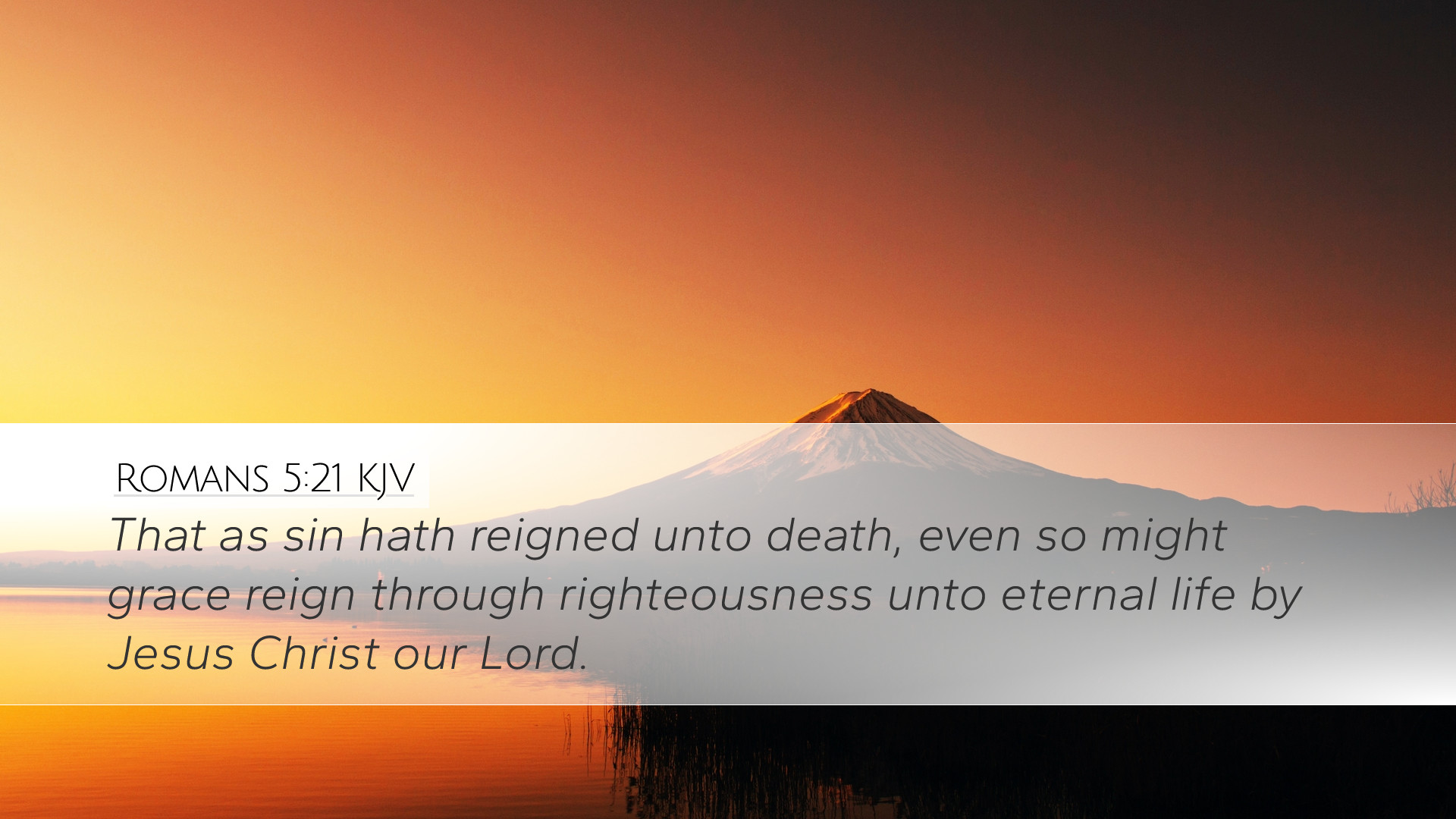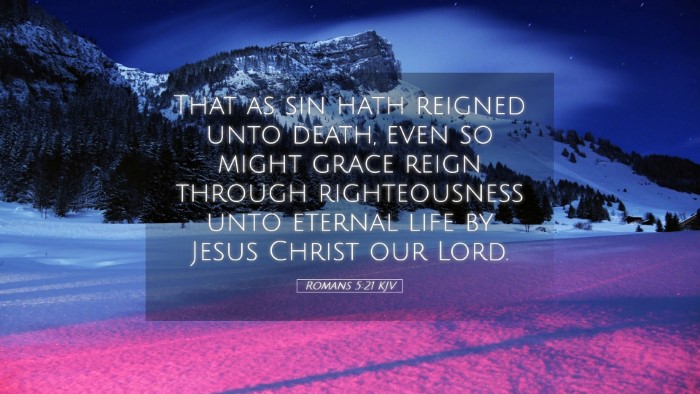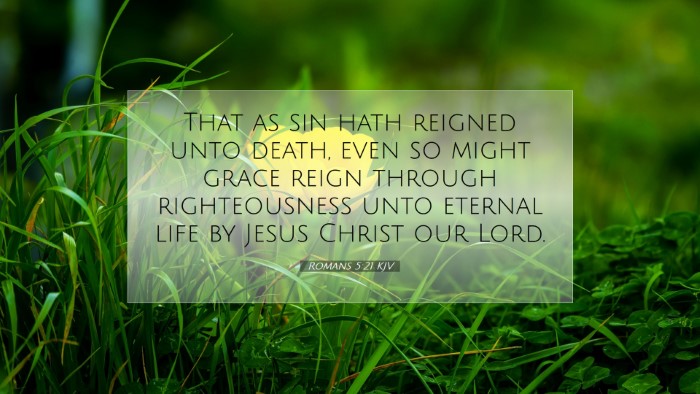Old Testament
Genesis Exodus Leviticus Numbers Deuteronomy Joshua Judges Ruth 1 Samuel 2 Samuel 1 Kings 2 Kings 1 Chronicles 2 Chronicles Ezra Nehemiah Esther Job Psalms Proverbs Ecclesiastes Song of Solomon Isaiah Jeremiah Lamentations Ezekiel Daniel Hosea Joel Amos Obadiah Jonah Micah Nahum Habakkuk Zephaniah Haggai Zechariah MalachiRomans 5:21
Romans 5:21 KJV
That as sin hath reigned unto death, even so might grace reign through righteousness unto eternal life by Jesus Christ our Lord.
Romans 5:21 Bible Commentary
Commentary on Romans 5:21
Romans 5:21 states: "So that as sin reigned in death, even so grace might reign through righteousness to eternal life through Jesus Christ our Lord."
Introduction
This passage encapsulates the profound truth of the Gospel, contrasting the dominion of sin and death with the sovereignty of grace and eternal life through Jesus Christ. It is essential for a pastor, student, theologian, or scholar to understand the intricate dynamics at play in this verse.
Summary of Key Insights
-
Sin and Death as Rulers:
Matthew Henry remarks that sin's reign leads to death, illustrating humanity's plight under sin's dominion. Adam Clarke emphasizes that sin had established a kingdom in the hearts of men, culminating in death as its crowning consequence.
-
Grace as the New Sovereign:
Henry contrasts the reign of sin with the grace that reigns through righteousness, highlighting that grace does not merely compensate for sin but overcomes it. Clarke notes that the grace of God is potent, displacing death's rule and offering believers eternal life.
-
The Role of Righteousness:
Righteousness is depicted as the necessary condition through which grace operates. Albert Barnes emphasizes that grace operates through righteousness—meaning it cultivates a life aligned with God's will, in contrast to the selfishness and moral decay of sin.
-
Connection to Eternal Life:
This passage culminates in the promise of eternal life. Henry observes that eternal life is not just a future hope but a present reality for believers. Clarke expounds on this notion, asserting that eternal life is found in the person of Jesus Christ, making his role pivotal in the experience of salvation.
Detailed Exegesis
To grasp the full significance of Romans 5:21, a detailed examination reveals various theological truths:
The Reign of Sin
In examining the phrase "as sin reigned in death", we recognize the apostle Paul’s emphasis on sin's authoritative influence before redemption. Henry elaborates that this reign is characterized by disobedience and the resultant condemnation. Clarke draws attention to the universality of sin's impact—its rule extends over all humanity, rendering everyone susceptible to its consequences.
The Reign of Grace
The transition to grace’s reign signifies a transformative shift. Barnes highlights that grace—a divine unmerited favor—employs righteousness not as a mere legalistic framework but as a relational dynamic reflecting the character of Christ. This aspect of grace invites believers into a new identity and purpose that aligns with the will of God.
Righteousness and Its Implications
The mention of righteousness necessitates a deeper understanding. Henry correlates righteousness with the character of believers who are empowered by grace to live according to God’s statutes. Clarke suggests that this life of righteousness is the outworking of a believer's faith, resulting in a transformative lifestyle that testifies to the work of grace.
Eternal Life through Christ
The culmination of Paul’s argument in this verse points toward 'eternal life' being a direct outcome of grace. As per Clarke, eternal life is synonymous with knowing God and experiencing a personal relationship with Christ. This relationship is not solely future-focused; rather, it brings a present assurance of salvation and communion with the Father.
Theological Reflections
This passage invites further theological reflection:
-
The Nature of Grace:
Grace is portrayed as a reigning force. This contrasts sharply with contemporary notions of grace as merely passive or forgiving. Henry asserts that grace is an active force that changes hearts and lives.
-
The Purpose of Righteousness:
Righteousness here serves as a vital instrument of grace. Barnes encourages a holistic view of righteousness that encompasses thoughts, behaviors, and relationships, fostering a community that reflects Christ’s love and mission.
-
Eschatological Implications:
The combination of grace and eternal life holds significant eschatological promise for believers. Clarke emphasizes that this life in Christ not only assures future resurrection but also encourages a transformative experience in the present life, stimulating hope and perseverance.
Practical Applications
Understanding Romans 5:21 brings practical implications for contemporary faith communities:
-
Embracing Grace:
Encourage congregations to recognize and embrace the reign of grace in their lives. Pastoral teaching can frame life experiences not solely by failures but by the ongoing work of grace that redefines identity.
-
Living Righteously:
Call congregants to actively pursue a life of righteousness—not as a legalistic expectation, but as a joyful response to the grace received through faith in Christ.
-
Anticipating Eternal Life:
Foster a community that lives in light of eternal perspectives, equipping believers to face life's challenges with the hope of eternal life, which can radically change their present actions and attitudes.


